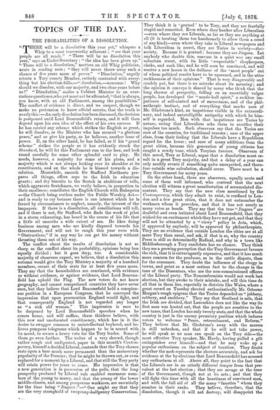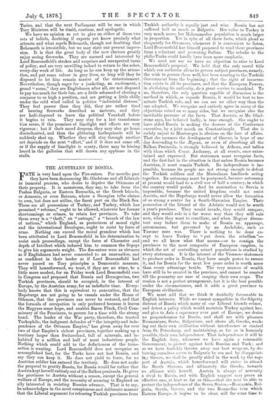TOPICS OF THE DAY.
THE PROBABILITIES OF A DISSOLUTION.
" HERE will be a dissolution this year yet," whispers a Whip to a most trustworthy adherent ; "see that your people are all ready." "There will be no dissolution this year," says an Under-Secretary ; "the idea has been given up."
There will be a dissolution," mutters an old Whig politician, acute in reading men ; "they will never throw away such a chance of five years more of power." "Dissolution," angrily retorts a Tory county Member, entirely contented with every- thing but his election-bills,—" dissolution,—nonsense ! Why should we dissolve, with our majority, and two clear years before us ?" "Dissolution," smiles a Cabinet Minister to an over- curious questioner,who yet must not be affronted," that is always, you know, with an old Parliament, among the possibilities." The conflict of evidence is direct, and we suspect, though we make no pretension to know official secrets, that the truth is nearly this :—An early dissolution has been discussed, the decision is postponed until Lord Beaconsfield's return, and it will then depend upon his own idea of the effect of his own success. If he has carried any scheme which strikes the English as great, he will dissolve, as the Minister who has secured "a glorious peace," and so give his party, as he believes, another lease of power. If, on the other hand, he has failed, or if his "grand scheme" strikes the people as it has evidently struck the Standard, he will let this Parliament run to the lees, and look round carefully for some other splendid card to play. He needs, however, a majority for some of his plans, and a majority which is not always looking over its shoulder at its constituents, and on the whole he is biassed towards a dis- solution. Meanwhile, smooth Sir Stafford Northcote pre- pares all things, offers sops to the Irish in education grants ; and dry biscuits to the Scotch in abolitions of tolls, which aggravate Scotchmen, we verily believe, in proportion to their smallness; conciliates the English Church with Bishoprics —the Church being restless under the Public Worship Act— and is ready to cry because there is one interest which he is forced by circumstances to neglect, namely, the interest of the taxpayers. If there is a dissolution, all conciliations will tell, and if there is not, Sir Stafford, who finds the work of pilot in a storm exhausting, has heard in the course of his life that a little oil smooths a wide extent of sea. He likes doing business among men who are kindly disposed towards his Government, and will not be rough this year even with " Obstructives," if in any way he can get his money without thrusting them out of his way.
The conflict about the results of dissolution is not so sharp as the conflict about its probability, opinions being less
equally divided ; but it goes deep, too. A considerable majority of observers expect, we believe, that a dissolution this autumn would give the Tory Ministry a majority of a hundred members, secure of their seats for at least five years more. They say that the householders are convinced, with evidence or without evidence, or against evidence, that Lord Beacons- field has upheld the Flag. The new voters do not know geography, and cannot comprehend countries they have never seen, but they believe that Lord Beaconsfield held a conspicu- ous position in a European Congress, that he conveyed the impression that upon provocation England would fight, and that consequently England is not regarded any longer as "a sick old woman." This impression is sure to be deepened by Lord Beaconsfield's speeches when he comes home, and will suffice, these thinkers believe, with this new and uneducated constituency, which has in it the desire to swagger common to unintellectual boyhood, and be- lieves pompous telegrams which happen to be in accord with its mood, to secure a heavy vote for the Tory leader. Some of them go even farther. The writer of a very shrewd, though rather rough and undigested, paper in this month's Contem- porary, himself a decided Liberal, contends that the Tory chance rests upon a base much more permanent than the momentary popularity of the Premier; that he might be thrown out, or even replaced for a moment by a Liberal, and that still the Tory party will retain power for years to come. His impression is that a new generation is in possession of the polls, that the long prosperity produced by Liberal rule enabled enormous num- bers of the young to marry, and that the young of the lower middle-classes, and among prosperous workmen, are essentially for the time being "Jingoes :"—" One might say that they are the very stronghold of twopenny-halfpenny Conservatism. They think it is 'genteel' to be Tory, and they are fearfully stupid and conceited. Even where they hanker after Liberalism —even where they are Liberals, so far as they are anything at all (it is treating them too handsomely to allow them a creed of any kind)—even where they take in Liberal newspapers and talk Liberalism in secret, they are Tories in society—their society. Because it is genteel : because they are Jingoes. Let anybody who doubts this, canvass in a quiet way any small suburban street, with its little 'respectable' shopkeepers, clerks, and such like, and he will soon be convinced, and will receive a new lesson in the dullness of the 'most people' out of whom political results have to be squeezed, and in the utter recklessness of their opinions." That is very disagreeably and crudely put, but there is no mistake about its meaning ; and the opinion it conveys is shared by many who think that the long shower of prosperity, falling on an essentially vulgar people, has developed the "music-hall spirit," a reckless im- patience of self-control and of earnestness, and of the phil- anthropic instinct, and of everything that marks men of Mr. Gladstone's kind, an impatience visible in the extraordi- nary, and indeed unintelligible antipathy with which he him- self is regarded. Men with that impatience are Tories by nature, seeing that Liberalism asks them to sacrifice their impulses too much. Such observers say that the Tories are sure of the counties, for traditional reasons ; sure of the upper class, from their feeling that the Liberals have a Republican regard for the lower ; and sure of many additions from the great cities, because this generation of young citizens has caught a rowdy tone, which Toryism favours. Observers of this mood, Tory or Liberal, argue that a dissolution must re- sult in a great Tory majority, and that a delay of a year can only modify events if something quite unexpected, and there- fore outside wise calculation, should occur. There must be a Tory Government for many years. On the other hand, there are observers, equally acute and some of them well informed, who contend that the next election will witness a great manifestation of accumulated dis- content. They say that the new class mentioned by the Contemporary, which they admit to exist, is confined to Lon- don and a few great cities, that it does not outnumber the workmen whom it provokes, and that it has not nearly as many votes as heads. They say that the true "Jingoes" are doubtful and even irritated about Lord Beaconsfield, that they wished for an excitement which they have not got, and that they will not be attracted by a " viewy " policy in Asia, which, if approved by anybody, will be approved by philanthropists. They see no evidence that outside London the cities are at all more Tory than usual, and ask, if that is so, why the country Press is still so determinedly Radical, and why in a town like Middlesborough a Tory candidate has no chance. They think they see a growing perception that the Tory Government favours the rich, that it is extravagantly expensive, and that it has much more concern for the producer, as in the cattle dispute, than for the consumer. They doubt the influence of the clergy in towns, and point as a most serious fact to the change in the tone of the Dissenters, who are the non-commissioned officers of the Liberal party. The Nonconformists would not work last election, but they awoke to their mistake, and will this time do all that in them lies, especially in districts like Wales, where a great crowd on Tuesday cheered enthusiastically Mr. Osborne Morgan's rough epigram that the Tories depended on" jobbery, robbery, and snobbery." They say that Scotland is safe, that the Irish are divided, that Lancashire does not like the way its first man was hooted out, that the people are sensitive to the new taxes, that London has only twenty seats, and that the whole country is just in the uneasy pecuniary position which induces voters to welcome "Peace, retrenchment, and Reform." They believe that Mr. Gladstone's sway with the masses is still unbroken, and that if he will not take power, he will speak as no man can speak on the Tory side—the most effective Tory speaker, Mr. Hardy, having pulled a gilt extinguisher over himself—and that he may wake up a popular enthusiasm on the subject of taxation. They doubt whether the mob represents the electors accurately, and ask for evidence at the by-elections that Lord Beaconsfield has aroused any enthusiasm at all. Above all, they point to the fact that the Liberals are in an utterly different temper from that pre- valent at the last election ; that they are savage at the tone of the Government, though not at its acts ; and that they will fight this time with all the heartiness of convinced men, and with the full aid of all the many "fanatics" whom they number in their ranks. They believe, therefore, that the dissolution, though it will not destroy, will disappoint the
Tories, and that the next Parliament will be one in which Tory Ministers will be timid, cautious, and apologetic.
We have no opinion as yet to give on either of these two sets of beliefs, doubting if experts yet know precisely what attracts and what repels Behemoth, though not doubting that Behemoth is irresistible, but we may state our present impres- sion. It is that the great body of the new electors greatly enjoy seeing fireworks. They are amused and interested by Lord Beaconsfield's strokes and surprises and unexpected turns of policy, and are very unwilling indeed to return to the sober, every, day work of life. As long as he can keep up the attrac- tion, and put some colour in grey lives, so long will they be disposed to let him remain master of the entertainment. Nevertheless, though eager for a junketing, an excitement, a grand "scene," they are Englishmen after all, are not disposed to pay too much for their fun, are a little ashamed of electing a conjuror to so high a position, and are getting a little chilly under the cold wind called in politics "industrial distress." They feel poorer than they did, they are rather tired of hearing fireworks described as meteors, and they are half-disposed to leave the political Vauxhall before it begins to rain. They may stay for a last transforma- tion scene, if the promises of limelight and effects are very vigorous ; but if their mood deepens, they may also go home disenchanted, and then the glittering harlequinade will be suddenly shut up. Whether they will stay through another net depends on the next "effect," and if it does not come off, or if the supply of limelight is scanty, there may be hissing heard in the galleries that will drown any applause in the stalls.



































 Previous page
Previous page